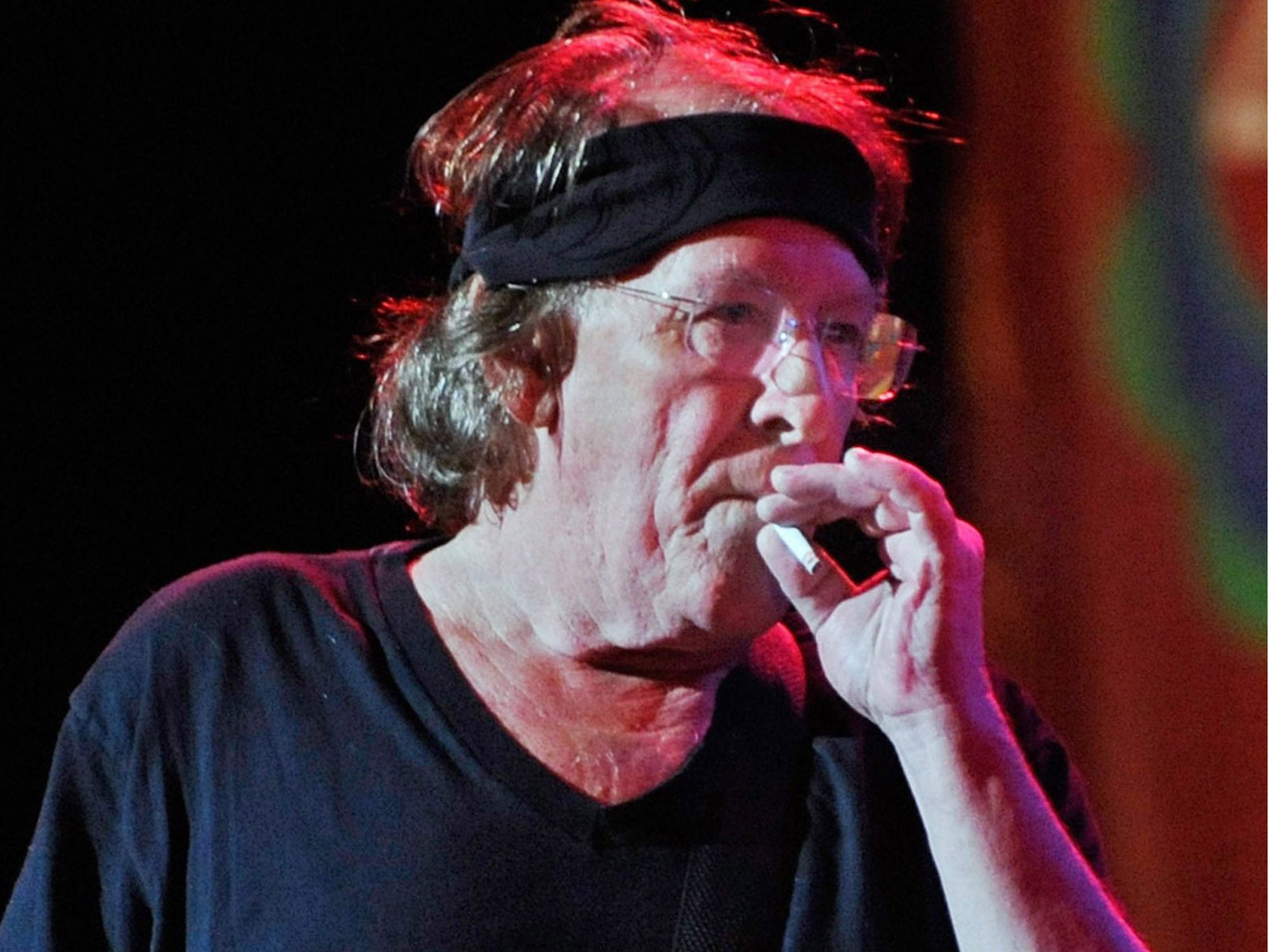Paul Kantner: Guitarist who co-founded Jefferson Airplane, spiritual leaders of the Sixties West Coast counter-culture
Surrealistic Pillow, their 1967 debut, saw them reach their commercial – and, arguably, creative – peak

Before San Francisco was inhabited by tech CEOs and Google buses, it was the land of hippies, flower power and tie-dyes, where talk of revolution mingled with the smell of marijuana. And though the Grateful Dead symbolise the Summer of Love for many, there was another, arguably more vital ingredient: Jefferson Airplane.
“[They] were both architects and messengers of the psychedelic age, a liberation of mind and body that profoundly changed American art, politics and spirituality,” wrote the Rolling Stone founder Jann Wenner. It was a renaissance that could only have been born in San Francisco, and the Airplane, more than any other band in town, spread the good news nationwide.”
One of their founding members, guitarist Paul Kantner, has died of organ failure and septic shock following a heart attack. “Paul was the catalyst that brought the whole thing together,” Jorma Kaukonen, the band’s lead guitarist, said. “He had the transcendental vision and he hung on to it like a bulldog. The band would not have been what it was without him.”
Kantner was born in San Francisco in 1941. His early life – a mother who died young, an emotionally distant father, time in a Catholic boarding school – set him on the trail of rebellion and rock’n’roll. After flirting with college, he decided to join San Francisco’s folk scene. “For me, it was the Kennedy aftermath that really shut the door on that world that had existed before,” he wrote. “There was no further reason to hold hope in those people, those values, that plan. An entire alternate quantum was necessary. And all the rules died. And into this world was born Jefferson Airplane thank god.”
The band formed in 1965, finding its stride with the gritty delivery and trippy lyrics of Grace Slick. What came to be known as the classic sextet was lush with something Grateful Dead sometimes seemed a bit short on: hooks and looks. “She was everybody’s dream for one good summer — in fact, for a good many summers after that,” Kantner later said of Slick.
Surrealistic Pillow, their 1967 debut, saw them reach their commercial – and, arguably, creative – peak. Songs like “Somebody to Love” and “White Rabbit” became classics; the record sold more than 1m copies. Kantner handled the sometimes intricate vocal arrangements, and contributed the song “D.C.B.A.-25”. “It’s basically an LSD-inspired romp through consciousness,” he said of the track.
The band went on to play Monterey, Woodstock – at 7.30 in the morning – and the doomed Altamont festival. There, Kantner confronted a Hells Angel onstage after the biker beat up a band member. Jefferson Airplane seemed to be part of every big 1960s cultural moment.
But the band had many decades to go, and not all of them were kind to the band. Kantner and Slick became a couple and more or less took control of the group, which splintered in the 1970s as side projects, solo albums and personal vendettas took priority. Kantner released Blows Against the Empire, a sci-fi themed concept album credited to Paul Kantner and Jefferson Starship; Jefferson Airplane became Jefferson Starship as members came and went.
While an arena-rock mainstay, Jefferson Starship drifted from their psychedelic roots, leading to a rift. Kantner, who resisted playing pop hits, left in 1984. After his departure and as a result of a lawsuit he filed, Jefferson Starship became plain Starship, a band loved and loathed for the song “We Built This City”.
“Usually I’m the last one at the party, but everyone else wanted to go in that more commercial direction,” he said in 2007. “That’s when I said, ‘If you want to play that, I’m gone.’ I really didn’t listen to it, because I was busy putting together a new band. But it was definitely cringeworthy.”
The band soon became known as much for the litigiousness of its members as for its music. Even when different versions of the band reunited, somebody seemed to be suing someone else. “Right now she’s suing me for some unknown reason, but generally we get along really well,” Kantner said of Slick, with whom he eventually split. “Twenty years ago, feeling tired of the music business, she signed over her interest in Jefferson Starship to me, and now she’s suing me for using the name. I actually had to go and dig up the piece of paper she signed, and I showed it to her, and she said, ‘I don’t remember that.’”
Unbowed, Kantner kept at it, playing for the faithful, even as their numbers dwindled. “The performance by singer-songwriter Paul Kantner at the Bayou Wednesday was more than a little dispiriting,” wrote The Washington Post in 1991. “For starters, there was the scant turn-out – fewer than 100 people showed up to hear the Jefferson Airplane-Starship veteran perform in a trio setting. And worse, some of those who did show up weren’t all that interested in hearing Kantner read poetry by Central American revolutionaries… Happily, the response to his music was far more positive.”
By the end, Kantner was the only member of Jefferson Airplane still living in San Francisco. “Somebody once said, if you want to go crazy go to San Francisco,” he remarked. “Nobody will notice.”
JUSTIN WM MOYER
Paul Lorin Kantner, guitarist, singer and songwriter: born San Francisco 17 March 1941; one daughter, two sons; died San Francisco 28 January 2016.
© The Washington Post
Join our commenting forum
Join thought-provoking conversations, follow other Independent readers and see their replies
Comments